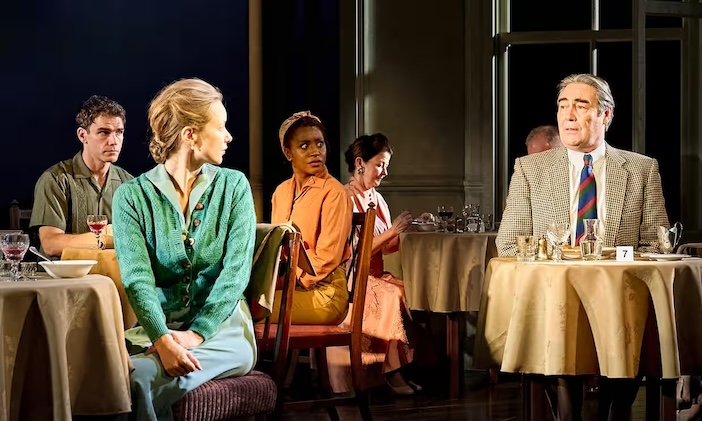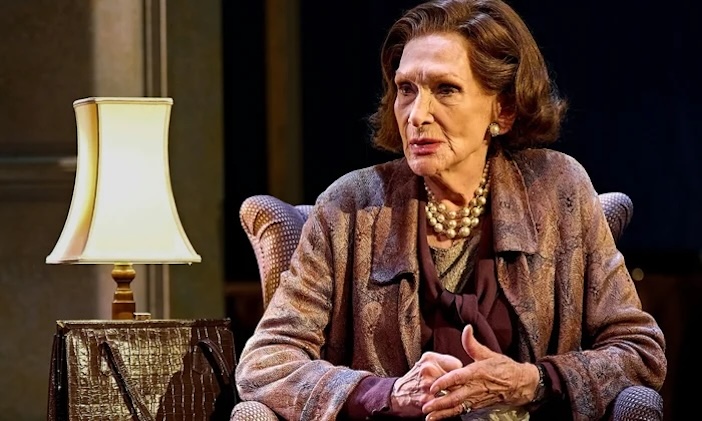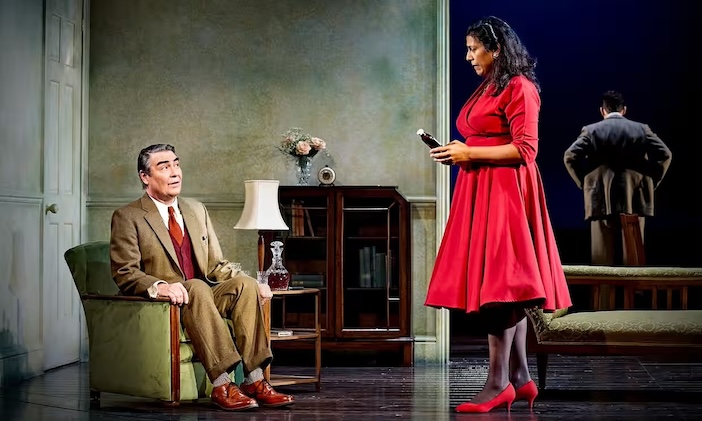The great Terence Rattigan – the playwright laureate of longing and repression – has been called underrated and overlooked so many times that this great dramatist is almost in danger of being over-exposed. Nearly half a century after his death, his accessible but never bland dramas – often described, once damningly but now admiringly, as “well made plays” – excel at capturing a certain kind of middle-class, middle-aged English malaise, when nobody is quite saying what they mean and where lifelong misery can be expressed by something as banal as a conversation about the weather. Subtext, subtext.
Summer 1954, James Dacre’s new staging of two of Rattigan’s one-act plays, drawing to an end after a lengthy and well-received national tour, does as much as might be hoped for and imagined to keep the flame alight. At a time when theatres like the National and the Old Vic seem largely uninterested in programming straight – and I use that most loaded of words advisedly – revivals of Rattigan’s work, there is a particular joy in watching a fine, starry ensemble deal with his writing with sensitivity and pathos, as well as having the odd surprise chucked in there as well.

Alexandra Dowling (in green) and Nathaniel Parker (right) in Table Number Seven (Photograph by Manuel Harlan, courtesy of Theatre Royal Bath).
The first play, Table Number Seven, will be the less familiar to most audiences, unless you happen to have seen the Oscar-winning picture Separate Tables, which used it as its basis. Major Pollock (Nathaniel Parker) is one of the permanent residents of a Bournemouth boarding-house, the kind of hail-fellow-well-met type who you’d usually try to avoid, otherwise you face an hour of military stories and reminiscences. Pollock is, however, a fraud, who has not only exaggerated his soldierly prowess, but has been arrested and bound over for the crime of soliciting young men late at night – a shift from the original version, in which he importuned young women in a cinema, but times were different in the Fifties.
Pollock’s nemesis is the gorgon-like Mrs Railton-Bell (Siân Phillips, still vital at 91), the self-appointed moral guardian of the boarding house, who is determined to expel him. Yet he finds unexpected but welcome support from the clear-sighted proprietor, Miss Cooper (Lolita Chakrabati), and Mrs Railton-Bell’s repressed, unhappy daughter Sybil (Alexandra Dowling), who can see into Pollock’s inner misery. The audience applauded long and heartily, as well they should.

Siân Phillips in Table Number Seven
Parker and Chakrabati return for the second, better-known one-acter, The Browning Version, which is similarly affecting, being a character study of a broken-down old classics teacher, Andrew Crocker-Harris and his unfaithful, spiteful wife. Crocker-Harris, who is unkindly nicknamed ‘the Himmler of the Lower Fifth’, is a classics scholar who has fallen on hard times both reputationally and in terms of his health, and is preparing to take a demeaning, penurious position at a crammer, having been denied a pension by the penny-pinching school that has exploited him for years. He finds a measure of solace in a gift from a young boy, Taplow, who gives him a copy of Robert Browning’s translation of Aeschylus’s The Agamemmon, but never fear, his wife is on hand to turn even this generous and thoughtful present into another weapon to injure him with.
The plays largely rely on Parker’s stage presence, and he’s ideally cast as the bluff, backslapping Major, who is only too able to suggest his true self when the chips are down. I was less convinced initially by his Crocker-Harris, but there is a moment when his benign, Humpty Dumpty face crumples in misery and pain as he realises precisely how little his life has amounted to, and it became very hard from that point onwards to resist.

Nathaniel Parker, left, with Lolita Chakrabarti, in The Browning Version, one half of Summer 1954 (Photograph by Manuel Harlan, courtesy of Theatre Royal, Bath)
The supporting cast is a particular treat – Chakrabati nails the hard Northern vowels of the faintly brassy, adulterous Millie, and Phillips is such a pro that she can bring out nuance and depth in a character who, as written, is the very representation of a battleaxe – and Mike Britton’s design retains interest throughout, not least the initial revolving stage which made me momentarily think that this was going to be experimental, but soon settles down into something far more conventional.
Summer 1954, then, is the kind of evening at the theatre that audiences ask for (it was virtually sold out when I saw it) but seldom get in the West End or London’s subsidised theatres. Rattigan did not achieve his fame and wealth for nothing, and this exemplary, highly moving revival is about as good as it gets. Will there be a London transfer? Well, here’s hoping.
Summer 1954 is on now at the Oxford Playhouse until Saturday 15th February. For more information, and for tickets, please visit www.oxfordplayhouse.com.
Photos by Manuel Harlan




